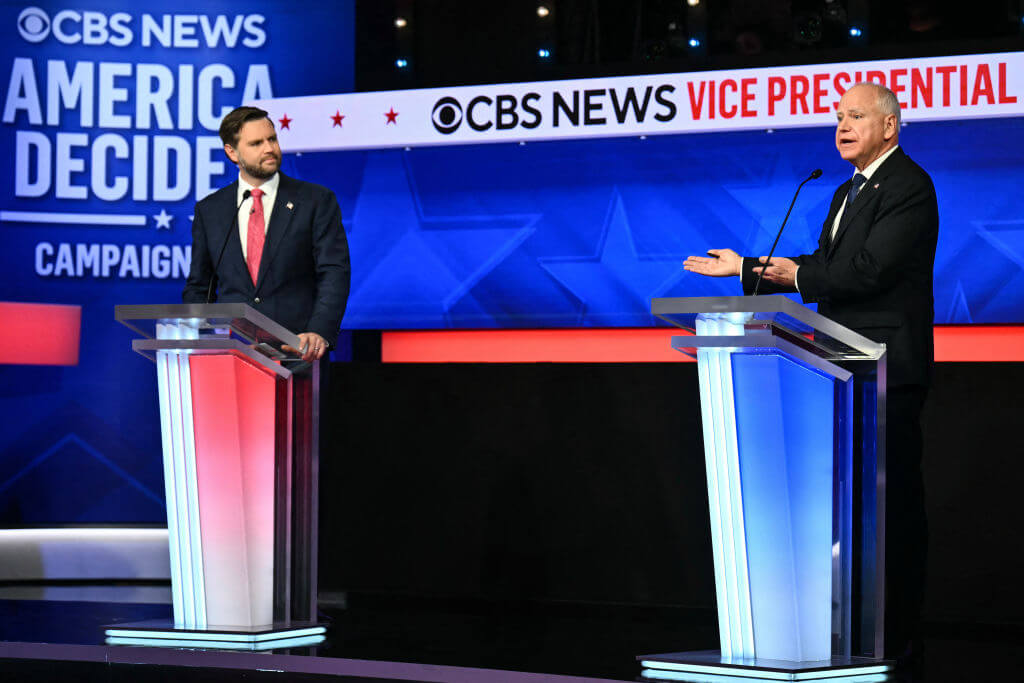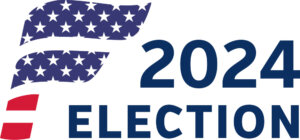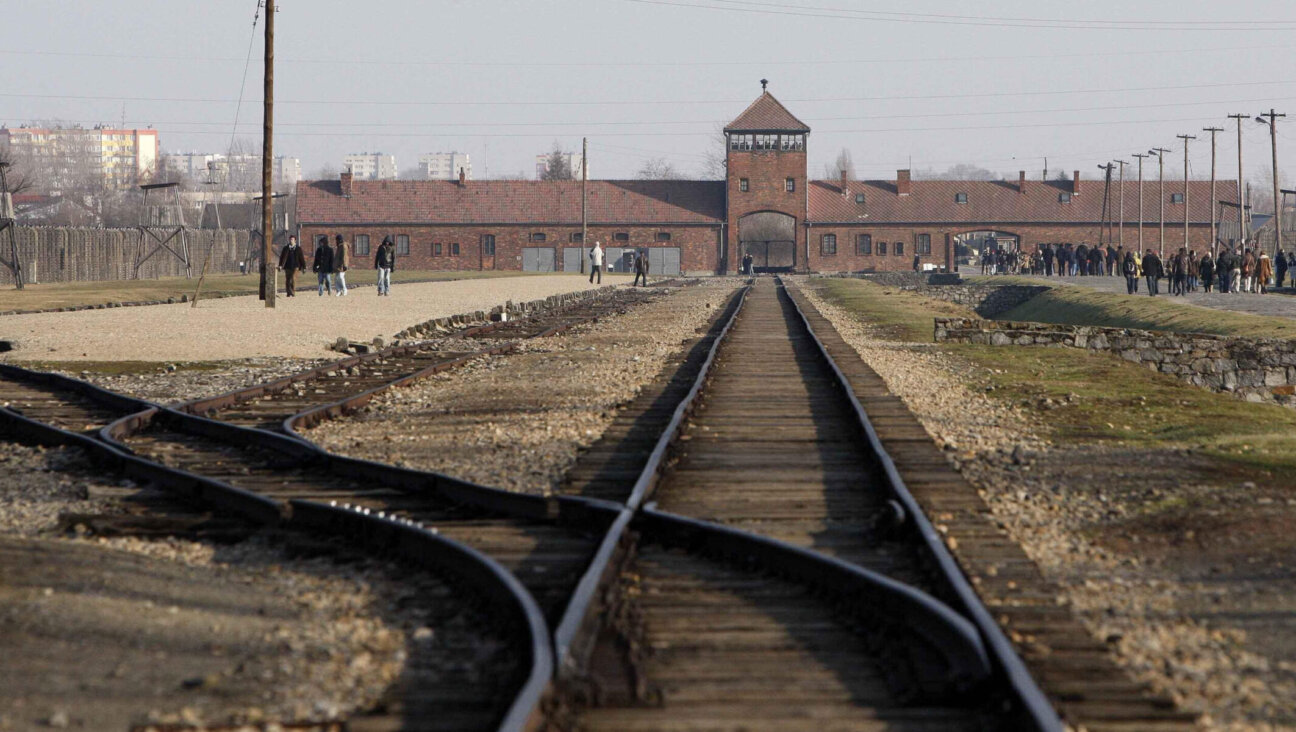First debate question to Vance and Walz: Do you support a ‘preemptive’ Israeli strike on Iran?
Hours after Iran attacked Israel, the vice presidential candidates weighed in on the conflict in the Middle East

Sen. JD Vance, left, and Minnesota Gov. Tim Walz at the vice presidential debate Oct. 1. Photo by Angela Weiss/AFP via Getty Images
The first question of the vice presidential debate Tuesday night focused on Israel, which had earlier that day been the target of an Iranian ballistic missile strike.
 Co-moderator Margaret Brennan asked Ohio Sen. JD Vance and Minnesota Gov. Tim Walz: “If you are the final voice in the Situation Room, would you support or oppose a preemptive strike by Israel on Iran?”
Co-moderator Margaret Brennan asked Ohio Sen. JD Vance and Minnesota Gov. Tim Walz: “If you are the final voice in the Situation Room, would you support or oppose a preemptive strike by Israel on Iran?”
Later in the 90-minute matchup, hosted by CBS News in its New York studios, Republican Vance was asked about his past comparison of running mate Donald Trump to Hitler.
And at the debate’s end, Walz tried to pin Vance down on the issue Jewish voters have identified as most important to them, according to polls: the preservation of democracy.
Israel and Iran
Both candidates dodged the question on Israel, which was first put to Walz, Democrat Kamala Harris’ running mate. He began by recounting the horrors of Oct. 7.
“Let’s keep in mind where this started,” he said. “Hamas terrorists massacred over 1,400 Israelis and took prisoners.” (Hamas murdered about 1,200 people in Israel that day.)
Walz said Israel’s ability to defend itself, the return of the hostages and ending the humanitarian crisis in Gaza is “fundamental.”
Walz, 60, also praised Harris’ “steady leadership” in a crisis, and contrasted her to Trump. “Nearly 80-year-old Donald Trump talking about crowd sizes is not what we need in this moment,” he said, referring to last month’s debate between Harris and Trump.
Vance, 40, said the question about a preemptive strike wouldn’t be answered in the Situation Room.
“Look, it is up to Israel what they think they need to do to keep their country safe,” he said. “And we should support our allies wherever they are when they’re fighting the bad guys.”
Walz and Vance also blamed each other’s running mate for the fact that Iran is now closer to having a nuclear weapon. It’s “because of Donald Trump’s fickle leadership,” Walz said.
“Who has been the vice president for the last 3 1/2 years?” Vance retorted. “And the answer is your running mate, not mine.”
Vance also said the Biden administration had boosted Iranian firepower by unfreezing “over $100 billion” in assets. Iran used that money, he claimed, “to buy weapons that they’re now launching against our allies, and, God forbid, potentially launching against the U.S. as well.”
The claim is misleading. About $55 billion in frozen Iranian assets were unfrozen as part of the Iran nuclear deal negotiated by the Obama administration. Trump scuttled the deal when he was president. The Biden administration, of which Harris is a part, did not revive the deal or unfreeze Iranian accounts.
Walz responded that Trump’s withdrawal from the 2015 nuclear deal and rocky relationships with world leaders committed to thwarting Iran allowed Tehran to advance its nuclear program.
A reference to Hitler
Brennan, who moderated the debate with Norah O’Donnell, asked Vance how the American people could trust him “to give Donald Trump the advice he needs to hear, and not just the advice he wants to hear,” given that he had once disparaged Trump by calling him “unfit for office” in 2016 and surmising that he could be “America’s Hitler.”
Vance said he’s been “extremely open about the fact that I was wrong about Donald Trump.”
“When you screw up, when you go to speak, when you get something wrong, and you change your mind, you ought to be honest with the American people,” he said.
The democracy question
Democracy is Jewish voters’ top issue: 45% of Jewish voters in a recent poll called it one of their top two.
O’Donnell noted that Vance has said he would not have certified the last presidential election, in which President Joe Biden had beat Trump. “Would you again seek to challenge this year’s election results, even if every governor certifies the results?” she asked.
Vance did not say he would, and accused Harris of censorship “on an industrial scale,” and referenced attempts to control misinformation on social media. “That is a much bigger threat democracy than anything that we’ve seen in this country in the last four years.”
Walz said trying to stop threats on social media is not censorship, and accused Vance of denying “what happened on Jan. 6, the first time in American history that a president or anyone tried to overturn a fair election and the peaceful transfer of power.”
“Did he lose the 2020 election?” Walz asked Vance.
“Tim, I’m focused on the future,” Vance responded. “Did Kamala Harris censor Americans from speaking their mind and the wake of the 2020 COVID situation?”
“That is a damning nonanswer,” Walz said.
A message from our Publisher & CEO Rachel Fishman Feddersen

I hope you appreciated this article. Before you go, I’d like to ask you to please support the Forward’s award-winning, nonprofit journalism so that we can be prepared for whatever news 2025 brings.
At a time when other newsrooms are closing or cutting back, the Forward has removed its paywall and invested additional resources to report on the ground from Israel and around the U.S. on the impact of the war, rising antisemitism and polarized discourse.
Readers like you make it all possible. Support our work by becoming a Forward Member and connect with our journalism and your community.
— Rachel Fishman Feddersen, Publisher and CEO























